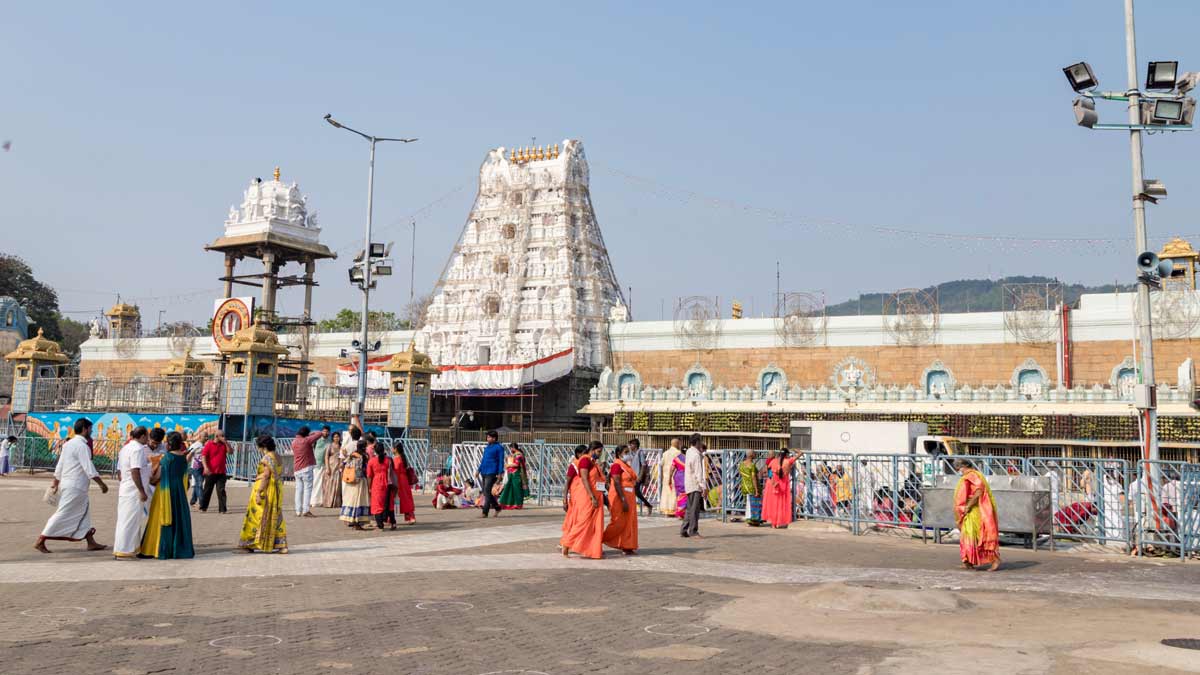On the occasion of completing 100 days in power, the ruling TDP government in Andhra Pradesh, instead of celebratory fireworks, ignited a controversy that shocked devout Hindus across the country and beyond.
Chief minister and TDP leader N Chandrababu Naidu, while discussing the functioning of the Tirumala Tirupati Devasthanam (TTD), alleged that animal fat had been used in the ghee for prasadam and sacred offerings, such as laddus, prepared at the Tirumala temple.
"They [YSRCP] have damaged the sanctity of the Venkateswara Swamy temple. Despite complaints, no action was taken. It saddens me to say that not only were inferior quality ingredients used in the prasadam, but animal fat was also used instead of ghee. Today, we have ensured the use of pure ghee and maintained better quality,” Naidu said at the meeting on Wednesday. He further informed that these findings came to light after conducting tests. His statements sent panic waves among the large base of devotees who visit the Lord Balaji temple atop the Tirumala hills.
Social media exploded with anxious and angry users seeking to know if the holy offerings had indeed been mixed with animal fat. The TTD, one of the wealthiest religious trusts globally, also came under fire.
VIDEO | Tirupati laddu controversy: Pilgrims express their views over Andhra Pradesh CM N Chandrababu Naidu's claim that animal fat was used in Tirupati laddus during the previous government.
— Press Trust of India (@PTI_News) September 20, 2024
"I have been coming here since last 10 years. Earlier, the quality of the laddus used… pic.twitter.com/4Hs1pLxinm
On Thursday, September 19, a TDP leader, Anam Venkat Ramana Reddy presented a report at a press conference, supporting the claim that animal fat had been found in the laddus. The lab reports, from tests conducted at the National Dairy Development Board (NDDB) in Gujarat, were made public. Samples of ghee, submitted between July 9 and 17, were tested for various parameters such as free fatty acids and milk fat, with the results issued between July 16 and July 23.
According to the reports, the ghee samples were tested for S-values, which indicate the purity of milk fat. If the S-values fall within the range of 95.90 to 104.32, the sample is considered pure milk fat. However, the S-values in the tested samples were either below 95.90 or above 104.32. The lab report stated that when S-values fall outside these limits, it suggests the presence of foreign fats. The adulterants could include fish oil, beef tallow, lard (extracted from pig fat), or other substances such as soybean or olive oil.
However, the report also included a disclaimer: “Under certain circumstances, false-positive results can be obtained.” Factors such as the health of the animal or the quality of its feed could influence the readings.
The timing of Naidu’s allegations raised eyebrows. Though the lab report had been available for two months, it was released only now. Also, as the ghee samples were collected during the first and second weeks of July—after the TDP had assumed power—questions arose about the party's responsibility. Critics also wondered why the TDP was highlighting the issue rather than the TTD itself, and why no names of vendors had been disclosed or action taken on them.
Naidu was supported by Deputy Chief Minister Pawan Kalyan, who tweeted about the development and called for the creation of a “Sanathana Dharma Rakshana Board” to address such issues.
Former TTD Chairmen YV Subba Reddy and B. Karunakar Reddy, who served during the YSRCP’s tenure, dismissed the allegations as baseless and politically motivated. They stated they were willing to take an oath before the deity to prove their innocence.
TTD officials remained silent, not releasing any official statement or taking a stand on the matter.
YSRCP chief and former Chief Minister Y.S. Jagan Mohan Reddy, at the centre of the controversy, accused Naidu of using the issue as a diversionary tactic to cover up his administration’s failures in the first 100 days. Jagan slammed Naidu for allegedly using a religious institution for political gains.
Commenting on the procurement process, Jagan said: “Tenders for ghee and other ingredients are called every six months, and the qualification criteria have not changed. Every tanker of ghee is certified by a NABL-accredited organization, and the product quality is verified. Three samples are taken from each tanker by the TTD, and all three reports must pass before the ghee is used in prasadam. This has been the practice for decades. Between 2014 and 2019, batches were rejected 14 to 15 times, while during our government, 18 batches were rejected. This is a robust system, and you should be glad such practices exist. You are spreading falsehoods and playing with the emotions of millions. Is that fair?” he questioned Naidu.
Jagan further emphasized that the TTD is an autonomous body and that the state government does not interfere with its operations. He announced plans to write to the Prime Minister and the Chief Justice of India, accusing Naidu of maligning the sacred institution and demanding accountability for his actions.
When contacted, AR Foods, a Tamil Nadu-based vendor supplying products to TTD, responded by saying, "We have seen that no company was mentioned in the report, so we cannot comment directly. Our products are regularly tested, and what we supplied to TTD met the required standards. We are ready to face action if anyone proves our products are of poor quality. Every batch is tested, so there is no chance of such issues."
NDDB’s lab could not be reached for comment.
The TTD and the Balaji temple are not new to controversies. A few years back, the temple was rocked with allegations from some quarters that jewels donated by the devotees went mysteriously missing. However, the issue also died down as quickly as it gained steam. Political analysts feel the current issue involving laddus will follow the same path given that is part of a political narrative.



